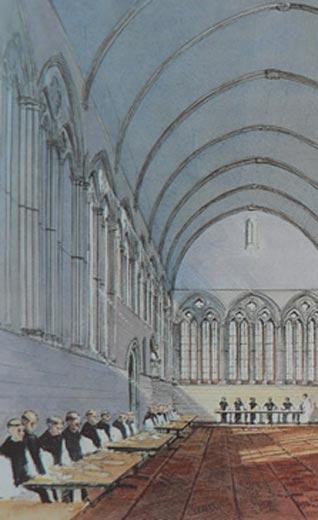
All images are of traditional Christian refectories in Europe, which were geared primarily to cater to monks and priests. The Sikh refectory was a marked departure from them and their eastern equivalents; it was designed to serve the larger community.


Resource Library
Langar, The Sikh Refectory
Part One
The Concept of Service
by PARKASH SINGH
Today, sikhchic.com begins a series on the history and development of the Langar. Written by a scholar who once also served as the Information Officer at the Darbar Sahib in Amritsar, it begins with the philosophical underpinnings of Langar, and then takes us on a journey which reveals how each Guru helped shape this central pillar of Sikhi as we know it today.
"Earning one's bread by honest labour; sharing one's earnings with the needy; and meditating on the holy name of the Lord Divine" is a convenient summing up of the fundamental teachings of Sikhism.
It is, therefore, a divine law that man must labour to earn his bread - for to live, man must work. Thus, "work is worship."
He alone treads the path of righteousness, says Nanak,
Who earns his bread with honest labour and shares it with others.
[M-I: 'ghal khae kichh hatho(n) de ...']
But earnings are to be shared with others willingly and with pleasure. "It is only what you willingly give away in charity to those who deserve it here, out of your lawful earnings, which will benefit your souls thereafter. [M-I: 'Nanak aggai so milai je khate ghale de ...']
That is ... practice charity, worship the Lord and deal honestly with your fellow-beings, says Nanak.
No matter how poor one is, there is always a piece of bread that can be shared and when so given makes one feel nobler. The desire to give and receive is part of the human nature which makes for graciousness in life. However instinctive may be the desire to give, it needs to be pruned so as not to be merely an emotional outpouring. Otherwise, charity would lose its effectiveness.
Sharing one's earnings with others is a gesture of service which is a practical expression of love. There can be no worship of God without active service, and those whom one is to serve must be loved. They who love the Lord love everybody - and hence serve everybody. Evils, such as caste and untouchability, that make distinction between man and man, have no place in a religion of service.
Religion does not consist in mere words:
He alone is righteous who looks on all men as equal.
[M-I: 'galli jog na hoi ...']
When you give a morsel of food to the hungry or a piece of cloth to the needy, you worship God through them. We have to serve one and all. When we face the whole humanity, we have to stand in reverence - that is, in proper attitude of service. God is best worshipped through selfless service of humanity wherein everyone participates to get His blessings.
Rid thyself of ego and perform service.
Then alone shalt thou attain honour.
[M-II: 'aap gavvaa-ey seva karey ...']
Guru Nanak wished his disciples to be servants of God and His people. Having created the human body, God has installed his very self therein. And, "This world is the chamber of God wherein resides the True One Himself" [M-II: Eh jugg sacchai ki hai ...]
Therefore, "service rendered here shall win thee a place of honour hereafter" [M-I: vicch duniya sev kamaa-ai ...]
This was a central lesson taught by the great teacher. Such examples of positive virtue which Guru Nanak gave, were a marked departure from the traditional ethics. There were always two kinds of duties: what we ought to do, and what we ought not to do. The world had very early recognized the latter, and many very beautiful sets of commandments - like the Jewish Decalogue - have come down to us.
But by concentrating all their attention on one side of the matter, the people forgot that any other side existed at all.
"Thou shalt not kill ... Thou shalt not steal ... Thou shalt not lie ... Thou shalt not do this or that" - this was all that was understood by Dharma or Duty. This emphasis on the negative side of virtue led to the adoption in the East of asceticism or renunciation as the highest ideal of life, which ultimately meant the negation of all human duty.
Guru Nanak preached positive truth. He substituted Love in place of all the intricate doctrines of faith.
And the practical expression of this Love was service.
His followers amply profited by this teaching. One can see no higher record of service in the annals of mankind than that of the Sikhs who were taught to annihilate the thought of self and to utilize all their energies in the service of God and mankind.
Discipline of service has played a prominent role in the evolution of the Sikh religion. Service in one form or another is an integral part of a Sikh's duty. According to Sikhism, service should not be confined to fixed forms of sectarian charity, but is to be freely varied according to the needs of those to whom it is rendered.
The Sikh Gurus make something of the man here in this world instead of merely promising high destinies in the world to come. For this purpose, the Sikh institutions were so designed as to abolish invidious distinctions between man and man and to retain all who came into their orbit in the arts of peace and service.
Continues ... Part II: "The Temple of Bread"
[First published as "The Temple of Bread", by Parkash Singh, by the S.G.P.C. at Amritsar, Punjab, 1964.]
January 17, 2011
Conversation about this article
1: Sangat Singh (Kuala Lumpur, Malaysia), January 17, 2011, 7:07 PM.
Please permit me some personal recitals that are indelibly etched on the canvas of my memory as a kid. It was in Lyallpur (Faisalbad) - now in Pakistan - before the partition. Our lives, thanks to the absence of TV, etc., revolved around the 'Wadda Gurdwara', the focal point of all activities, religious, social and lookan meti, etc. It had of course the Langar Hall, but with a difference. Panthic Daal- the ubiquitous 'Moongi and Chanaa Dals' and vegetables were cooked there but not the rotis. They were contributed by the sizable Sikh community surrounding the Gurdwara. Between 12:00 and 12:30 pm, when a Bhai ji carrying a wicker tokri covered with a spotless white cloth and a danda in his hands would knock at each Sikh household door, intoning 'Satnam, Waheguru' and my elder sister would rush out with the first 2 or 3 freshly baked 'tandoori' rotis for the basket. As growing kids, we were always ravenously hungry. But the firm iron clad rule for the kitchen to open only was after Bhai ji had received the first two or three rotis for the Guru ka Langar. If this were to be practiced today, the poor Bhai ji stands a good chance of being run over by the unruly, haphazard traffic to be dispatched to the Guru's Court sans basket and 'danda'.


